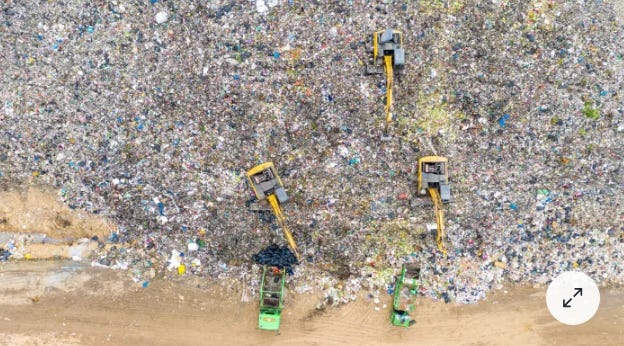Scientists discover plastic-gobbling enzyme that can break down trash in 24 hours: The possibilities ‘are endless’
Researchers at The University of Texas in Austin discovered an enzyme that eats plastic fast, and scientists think it could revolutionize how we deal with waste.
Researchers at The University of Texas in Austin discovered an enzyme that eats plastic fast, and scientists think it could revolutionize how we deal with waste.
The team used artificial intelligence, chemical engineering, and synthetic biology to turn a natural enzyme called PETase into a plastic-eating machine.
Quick science lesson: PET, which is short for polyethylene terephthalate, the chemical name for polyester, is a clear, strong, and lightweight plastic that’s widely used in food packaging and plastic bottles. PETase got its name from its ability to degrade these PET plastics.
To deconstruct PET plastic even more quickly and at low temperatures, researchers adjusted PETase to create a new enzyme, called FAST-PETase, which gives bacteria the ability to recycle waste plastic efficiently.
Since plastics account for 8% of all solid waste globally and this new enzyme is laser-focused on breaking it down, this is a potentially crucial discovery.
Most plastic — about 90% — isn’t recycled and either ends up in landfills, where it can leach long-lasting chemicals into the ground, or is burned or broken down at huge energy costs and tons of pollution produced. This enzyme, however, takes much less energy to produce and works quickly.
Plastic that would last almost 500 years in a landfill can be broken down in a day by bacteria armed with FAST-PETase and turned into base units that can be reused.
Hal Alper, a professor of Chemical Engineering at UT Austin, told UT News that the possibilities of this discovery “are endless.”
“Beyond the obvious waste management industry, this also provides corporations from every sector the opportunity to take a lead in recycling their products,” he said. “We can begin to envision a true circular plastics economy.”
The “circular economy” refers to an economic approach that relies on developing new goods without waste or pollution, reusing products and materials to their fullest extent, and restoring natural systems.
Right now, humans have a so-called linear economy, also known as a “take/make/waste system,” in which we take raw materials, make a product, and then throw it away when the product becomes damaged or is no longer usable. By recycling plastic more efficiently, plastic waste can be diverted into more useful products, and the entire industry can become more sustainable.
The scientists at UT Austin are ramping up production for real-world uses. They see this product cleaning up landfills, high-waste industries, and polluted natural areas in the future.
Join our free newsletter for weekly updates on the coolest innovations improving our lives and saving our planet.
o paid at the $5 a month level, and we will send you both the PDF and e-Pub versions of “Government” - The Biggest Scam in History… Exposed! and a coupon code for 10% off anything in the Government-Scam.com/Store.
Go paid at the $50 a year level, and we will send you a free paperback edition of Etienne’s book “Government” - The Biggest Scam in History… Exposed! AND a 64GB Liberator flash drive if you live in the US. If you are international, we will give you a $10 credit towards shipping if you agree to pay the remainder.
Support us at the $250 Founding Member Level and get an Everything Bundle – The Sampler of Liberty! - Get it free by going paid as a Founding Member!
Give me Liberty... and give me more! The Everything Bundle includes the latest version of our flagship book on government, along with a collection of potentially life-altering introductions to voluntaryism, agorism and peaceful anarchy.
“Government” – The Biggest Scam in History… Exposed! by Etienne de la Boetie2
Anarchy Exposed! - A former police officer reports on his investigative journeyby Shepard the Voluntaryist and Larken Rose
The Most Dangerous Superstition by Larken Rose
Sedition, Subversion and Sabotage – Field Manual #1 by Ben Stone, The Bad Quaker, and Ken Yamarashi
What Anarchy Isn’t– A short pamphlet by Larken Rose… The perfect introduction to peaceful anarchy
Three Friends Free – A Children’s Story of Voluntaryism
The Liberator is a 64GB wafer flash drive filled with books, documentaries, podcasts, MP3s, short videos, and music from the truth movement’s leading artists. The credit card-sized format makes it convenient to keep in your wallet to share and copy easily.










And here is something for every ones digestion...
https://www.globalresearch.ca/global-war-ning-geoengineering-is-wrecking-our-planet-and-humanity/5753754?utm_source=substack&utm_medium=emails
I wonder whether this enzyme was tested to see if it dissolves anything ELSE besides plastic...? also I wonder whether it is introduced to plastic in a specific closed environment, or released into the ocean, ground, etc. to "seek and destroy" plastic.
Plastic is a petroleum product, so would this enzyme also digest other petroleum products?